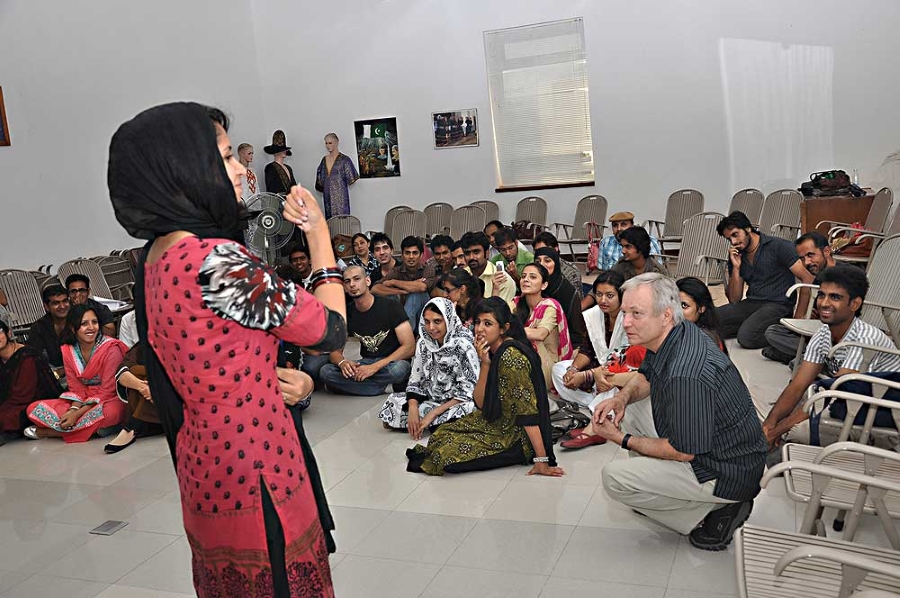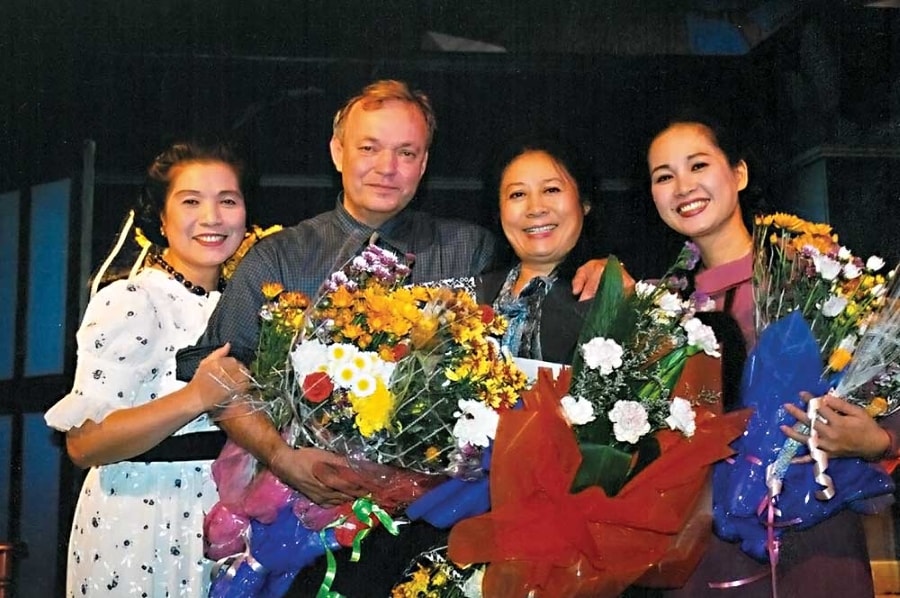On his first visit to Egypt and his second tour outside the U.S., in 1991, Allen Nause and a little group of Portland actors made their debut in Cairo in an abandoned movie house pressed into use as a theatre for the now-defunct Cairo International Festival for Experimental Theatre.
They started their performance of The World of Carl Sandburg to a packed house, according to Nause, and then a few minutes into the show the lights went out. Everyone sat in the pitch dark and waited. Soon it became apparent the blackout affected the entire neighborhood, and Nause suggested that, in this case, maybe the show couldn’t go on.
“The audience said, ‘No, no, you must go on,’” Nause recalls. “So people reached into their purses and found a bunch of flashlights. They pointed them at us onstage, and we finished the show. That was our first experience on that tour. But it just shows you the power of art: Those people were so hungry for it.”
Nause’s accounts of his numerous foreign adventures are full of similar examples of flexibility and pragmatism, but maybe the most important lesson is the literal one: That illumination is as likely to come from the audience, and the culture it represents, as from the stage. And Nause’s profound understanding of this may explain his success in countries as diverse as Egypt, Kenya, India, Pakistan and Vietnam. And maybe even here at home, in Portland, Ore.
Nause began his tenure as the first artistic director of Artists Repertory Theatre, then one of a number of scuffling smaller theatres in Portland, in 1989, about the same time the Arts America program reached out to him to conduct the tour that started in Cairo. As Artists Rep slowly grew into the city’s second-largest company with its own two-theatre home, Nause’s experiences abroad grew more complex and ambitious. (Nause will step down in June from the leadership of Artists Rep, though he’ll stay on as part of its resident acting company; his successor as artistic director is Dámaso Rodriguez.)
Nause had gotten involved in Arts America (which has since become a State Department program) a few years earlier, after he and another former Oregon Shakespeare Festival actor, Jack Cantwell, started a small American touring company called National Theater Express, which took its productions to places that usually didn’t have a chance to see live theatre. The father of one of the crew worked for Arts America, and the connection was made.
That first tour was primarily African—Ghana, Cameroon, Nigeria, Kenya, and then Bangladesh. The experience resonated with Nause, who was beginning to figure out his course as an artist: “For me it was amazing. I got to go to these places, I got to do my work as an artist, and I could see how theatre, and the arts in general, are a great way to break down the barriers between cultures. When you get actors and audiences in a room and they are sharing ideas, it’s amazing how the walls and barriers just come tumbling down.”
That tour went well enough to earn a second invitation from Arts America, for the tour that started in Cairo and then hit India, Pakistan, Nepal and Bangladesh. It involved not only the Sandburg piece but Driving Miss Daisy and A Journey Through American Comedy, the latter comprising comic snippets from lots of different shows.
JoAnn Johnson was an actor on that tour, and for her a key moment came before the company had even left town: “We were hooked up for an interview via telephone with artists from Bangladesh, and the first question from them was something like, ‘Why are you coming?’ The tone of the question seemed to me to imply a suspicion that we would somehow view ourselves as superior artistically. Allen’s response was, ‘What would you hope that we could bring you?’ That’s an illustration of Allen’s ability to see right through to the real issue—and to respond with humility and honesty.”
From the standpoint of connections made, perhaps the most important part of this tour came in Bangalore, when, as Nause tells it, a young Indian playwright thrust some of his work through an open car window as the company left town. The importunate writer turned out to be Mahesh Dattani, and that was the beginning of a fruitful relationship that led to readings of Dattani’s plays in Portland, a role in Artists Rep’s production of A Perfect Ganesh and an invitation, through the U.S. Embassy, back to India for Nause, to direct a version of Our Town in Bangalore for Dattani’s theatre in 1993.

Dattani remembers that Our Town well. “Allen became very popular with the entire team,” Dattani says. “He is quite a good-looking fellow, and I remember he broke many hearts! For several years to come we would remember his time with us and his patience. Allen won us over with his incredible talent, patience and warmth.”
Another Arts America tour to southern Asia followed, this time with Edward Albee’s Three Tall Women in tow—but let’s jump ahead to 2000, and Nause’s first trip to Vietnam to direct A Midsummer Night’s Dream, an assignment that grew out of a relationship with Lorelle Browning, who teaches theatre at Pacific University near Portland. This trip provided Nause with a five-month adventure in cultural diversity.
The Midsummer included two American actors who performed in English, and the rest were members of the National Theater of Vietnam, who performed in Vietnamese. But when Bottom, played by Vietnamese actor Quang Thai, performed the comic lines, “The eye of man hath not heard, the ear of man hath not seen…,” trouble started.
“All the actors turn their heads to me and say, ‘He can’t say that! He’s saying it wrong,’” Nause remembers. “And I responded that he’s not saying it wrong, that’s the joke. Then my Vietnamese co-director [Doan Hoang Giang] comes to me and says it won’t work. I say, ‘Oh yes, it will work, it’s the joke!’”
But then Nause tried the scene out on a Vietnamese test audience. “We do a run-through, we get to that scene, he says that line, and all the heads turn to me as one, and people say, ‘He made a mistake!’ It just didn’t translate.” Another lesson: When an intractable problem arises in a scene, it’s probably because of a cultural reason—or, as Nause puts it, “Sometimes things just aren’t translatable.”
Nause’s Hanoi adventure (which also included an all-Vietnamese version of The Glass Menagerie) was recorded in a documentary, A Dream in Hanoi, which focuses on the cultural frictions in the production. Ultimately, Midsummer toured the U.S. and led to several more trips back to Vietnam.
In 2008, Nause went back to the Middle East to direct All My Sons for the National Theater of Palestine, and then to Pakistan in 2011 to direct The Odd Couple. He was at first reluctant to dig into the Neil Simon chestnut, because there were so many other possibilities. “But it turned out to be a great choice, because when you think about it, America and Pakistan are the odd couple,” Nause reasons. “The play has so many ramifications when you think about our shrinking planet and these so seemingly different cultures having to occupy the same space. I think it really resonated there. I know it did.”
Now Nause wants to bring the actors who played Oscar and Felix, plus his assistant director and stage manager in Islamabad, to Portland to work on The Invisible Hand, a hostage thriller by the Pakistani-American playwright Ayad Akhtar. Foundations have been slow to fund this international exchange, though Nause has hopes that they still might step up. In the meantime, the company is hoping visas go through in time for an October or November opening, even if only the actors can come. And, in the meantime, Nause is negotiating to return to Karachi to direct West Side Story with an all-Pakistani cast. Jets and Sharks, indeed.
Ask Nause how it has all changed his practice as an artist—he mentions the idea of moving away from kitchen-sink realism to embrace more “world theatre” ideas, as you might expect him to. But ultimately, it’s simpler than that for him. “Everything that happens makes you the person you are,” Nause says, “and that affects you as an artist.” As long, he might add, as you’re willing to let the audience shine its light on you.
Barry Johnson has covered the arts in Portland, Ore., since 1979, for Willamette Week, The Oregonian and, most recently, as the editor of the website Oregon Arts Watch.


